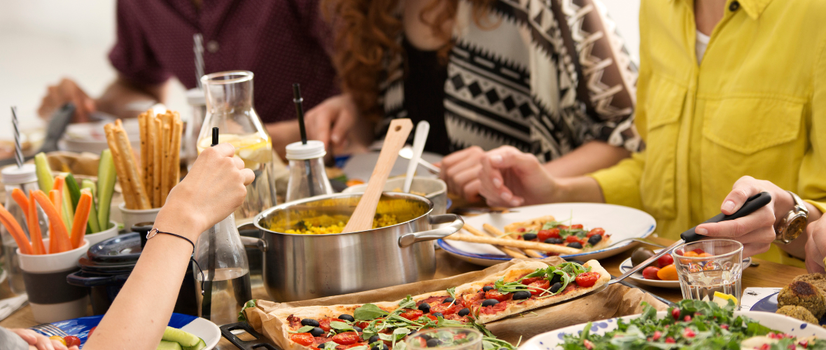
10 tips to eat healthier when you are out
Jessica Ferguson APD
It can be hard to choose healthier meals, snacks and drinks when you’re away from home, and it’s something I even struggle with as a dietitian.
So, here are my top 10 tips and tricks to make it easier to choose healthier options, especially when your social calendar is packed or you need to watch what you eat for health reasons.
1. Don’t head out starving
If you're already really hungry before you leave home have a small snack, such as a piece of fruit. Grabbing an apple is an easy option and science shows eating a piece of fruit will help fill you up and reduce your appetite at the next meal. Or if you’re already out, start with a broth-based soup or small salad to ward off ravenous hunger.
2. Have a glass of water before you order
When we are dehydrated our body uses up more of our stored glucose, which can trigger hunger pangs and even cravings for sweet food. It’s easy to confuse thirst and hunger, so try a glass of water before you order more than you need. Water or mineral water with a wedge of lemon is also a great option during a meal. Try to limit alcohol and sugar-sweetened drinks. Soft drinks can be a major source of added sugars and are known to increase risk of chronic disease when consumed excessively.
3. Look for the vegetables
Choose meals with lots of vegetables such as salads, stir-fries and vegetable curries. Or order a delicious vegetable side. As well as getting tasty ideas for when you cook vegetables at home, this is a clever way to give your body the variety of nutrients it needs and help you reach the recommended 5 serves for the day.
4. Choose dishes loaded with legumes, pulses, nuts and seeds
Legumes, nuts and seeds are great sources of plant protein and fibre, which will help you to stay fuller for longer. Nuts and seeds also provide a fantastic source of healthy fats that help you to feel full, plus they’re great for your heart health.
Looking for legumes? Keep an eye out for dishes with all types of beans, peas, and lentils. Such as hummus dip or a baked egg shakshuka for brunch.
5. Avoid fried, battered and ‘oily’ choices
Instead look for dishes that are described as steamed, pan fried, braised, poached, baked, roasted, grilled or raw. Limit pastries, such as pies and sausage rolls, as these foods are often high in saturated fats (sometimes called the ‘bad fats’) and may contribute to the risk of heart disease, stroke and other chronic diseases.
6. Choose fresh tomato-based sauces
Try to limit sauces that are high in fat and salt, such as creamy-based dishes, lots of cheese, and fatty meats. White creamy dressings such as mayonnaise, ranch, aioli and Caesar also fall into this category. If you really love a creamy sauce or dressing, ask for it on the side and simply use less. Better still, go for extra virgin olive oil based salad dressings, vinaigrettes, lemon/lime juice, relish, mustard and sauces based on fresh tomato sauce like an eggplant parmigiana.
7. When travelling, stop at cafés or bakeries
That may sound counterintuitive, but bakeries and cafes can offer more variety and fresh options to customise your meals. Try a wholegrain roll or wrap with plenty of salad.
8. Ask yourself ‘do I really need to upsize?’
Try to limit upsizing your meals unless it’s with an extra serve of vegetables. If you are at a buffet or can serve yourself restaurant, make sure the vegetables dominate the plate.
9. Go fruity for dessert
A fruit-based dessert is a delicious way to get a sweet treat, that still provides fibre and other vitamins and minerals. It could also count towards your 2 serves of fruit a day. Another way to make dessert a little healthier is to cut back on how much you eat by sharing it. Let’s face it, a lot of the pleasure associated with dessert is in the first mouthful, so why not share that experience.
10. Don’t overdo it
Did you know it takes about 20 minutes for your brain to get the message from your stomach that you are no longer hungry? To help yourself from overeating, it’s important to listen to your body, chew slowly, savouring every bite and monitor how hungry or full you really feel.
Do you have a diet question? Or have you seen a nutrition study and wondered about what it means? We’d love to hear from you.
Contact our team of expert dietitians by using the free Ask a Dietitian service - online form here, or you can email or call on 0800 673 392.

The latest nutrition advice, plus health and wellness tips delivered to your inbox monthly
